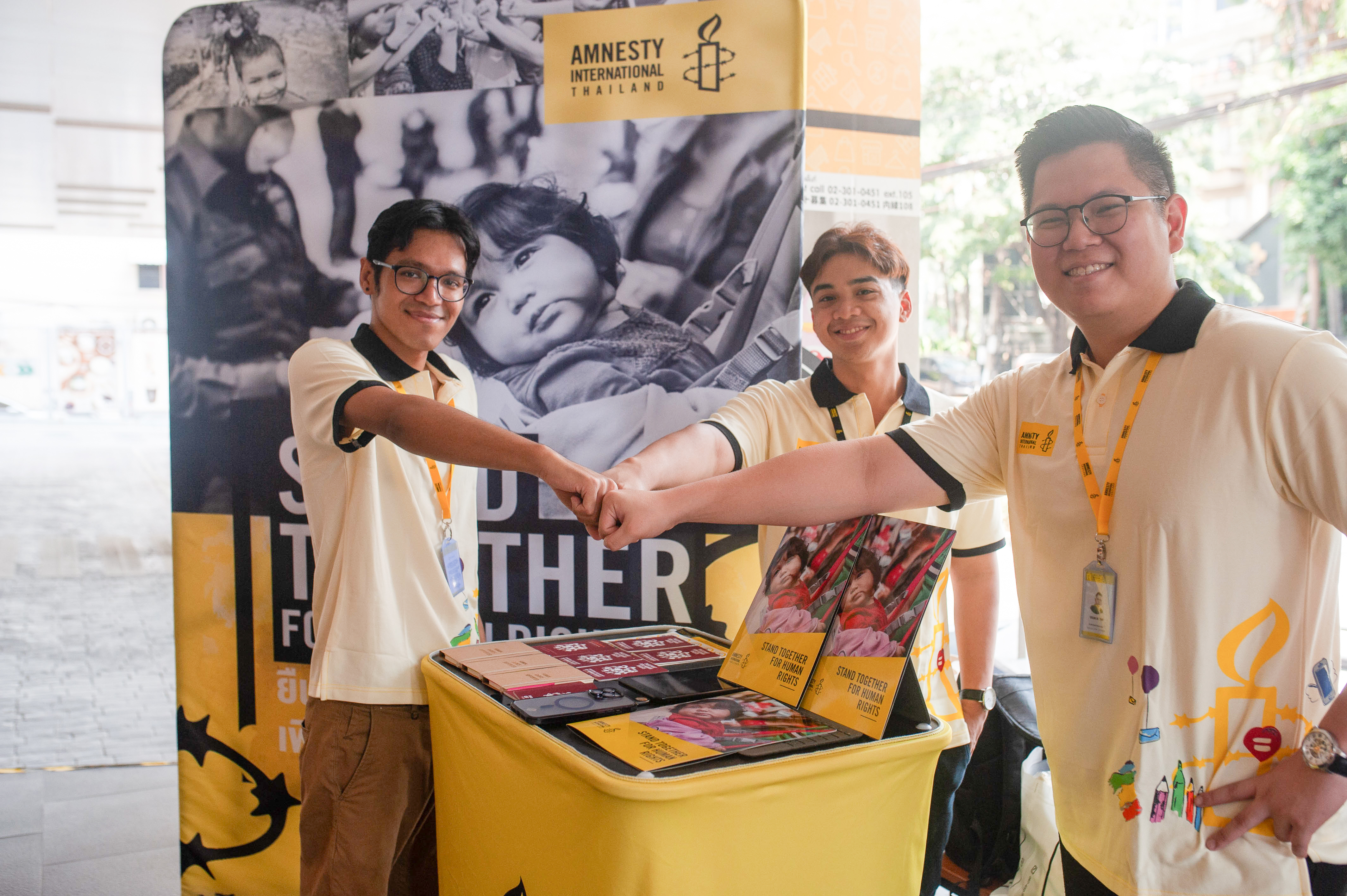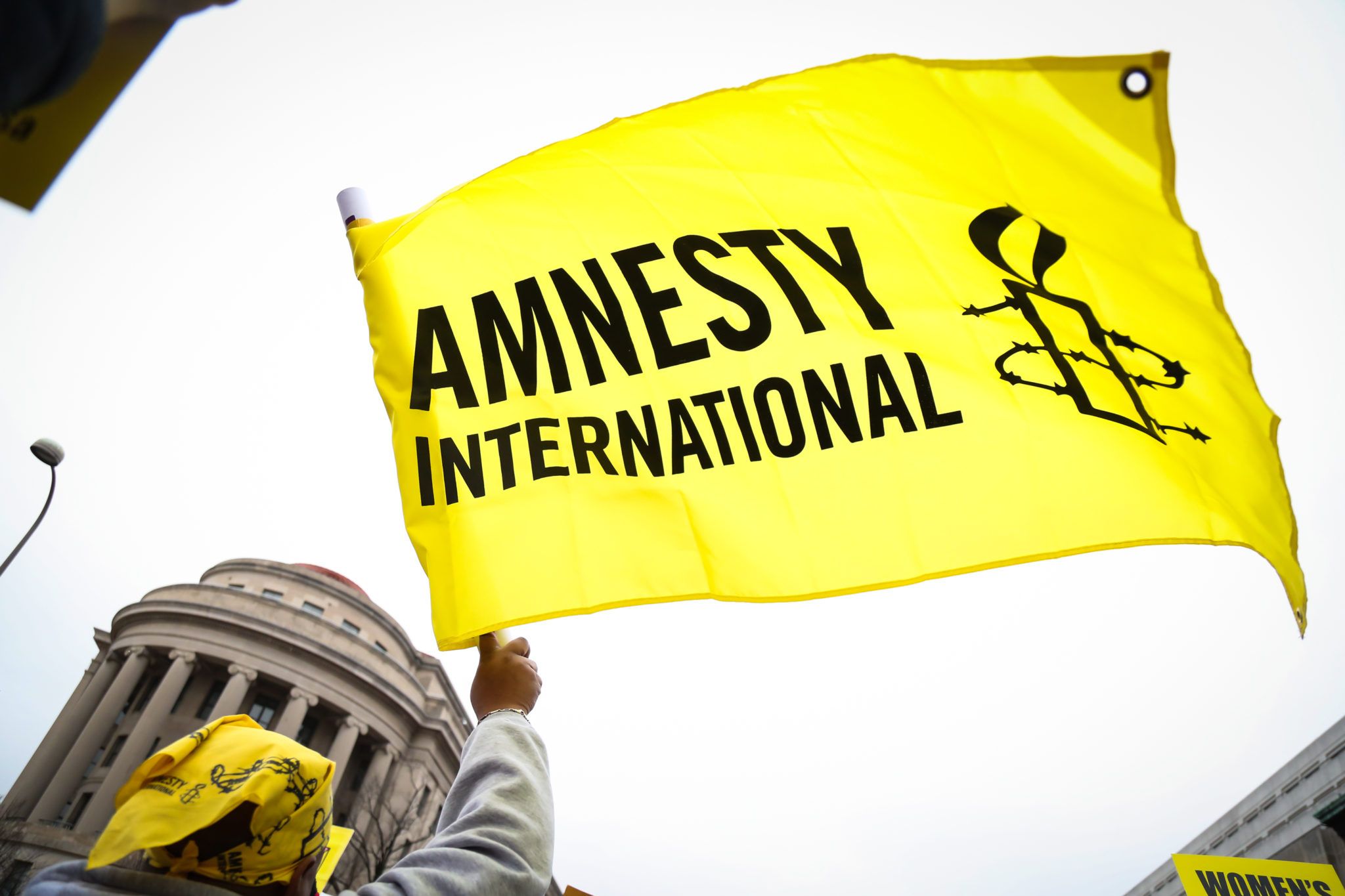Amnesty International Thailand Launches "Face2Face" Fundraising Program: Empowering Ordinary People, Creating Change
2 April 2024
Amnesty International Thailand
Amnesty International Thailand announces its full support for 'those who are affected by human rights violations' in Thailand and around the globe. The organization kick off the fundraising efforts with a Face2Face fundraising program, hoping to drive policies, laws, and justice processes that are transparent, fair, and efficient according to international human rights principles.
Amnesty International Thailand launched a new fundraising initiative called "Face2Face" which involves individual fundraisers stationed at various locations. The goal is to harness the collective power of ordinary citizens to advocate for policies, laws, and regulations that align with international human rights standards. Amnesty Thailand is also committed to promoting human rights education and supporting those who have had their human rights violated. Amnesty Thailand believes that everyone deserves to be treated fairly and to have the freedom to express themselves.
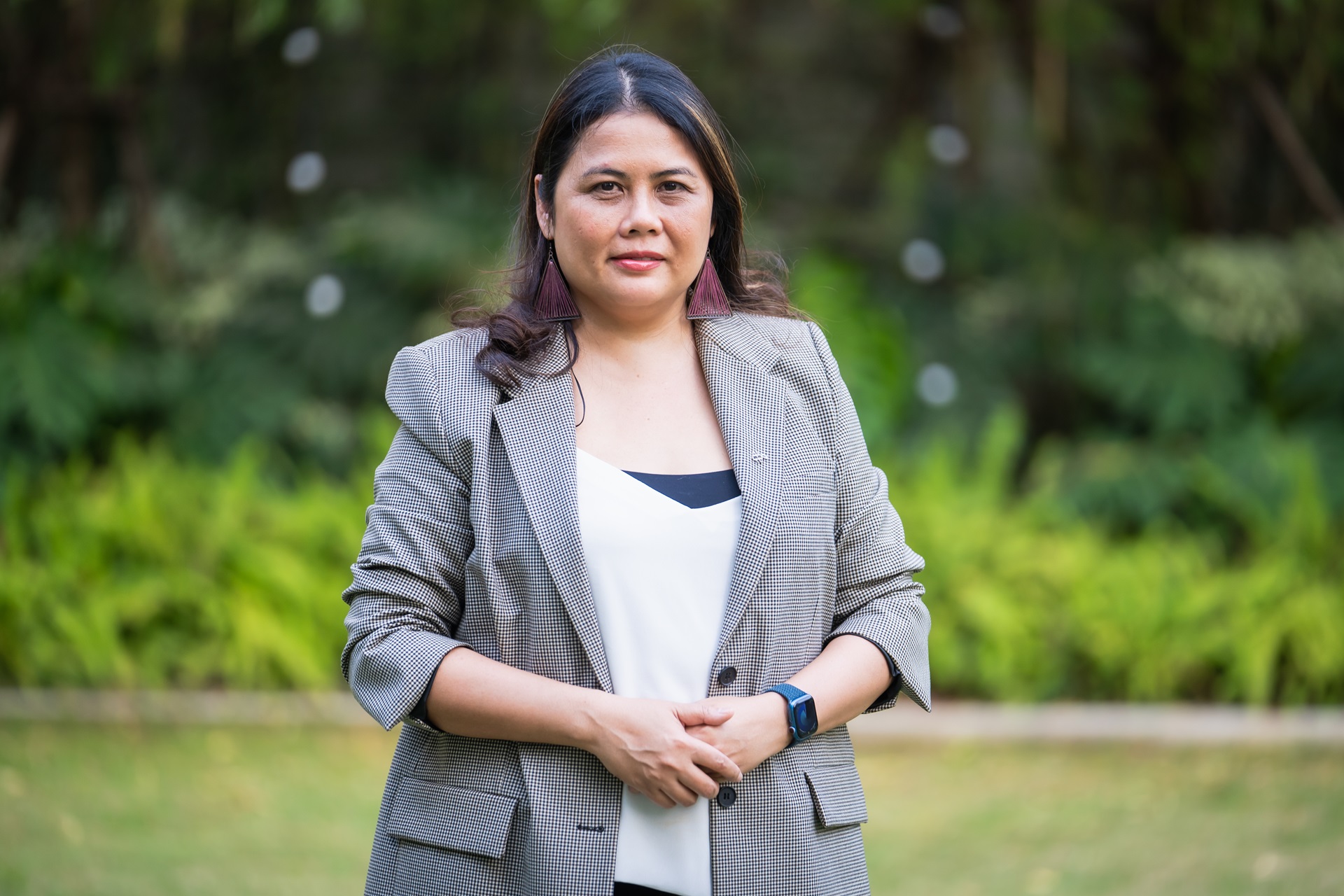
Piyanut Kotsan, Director of Amnesty International Thailand, observes that in the past 2-3 years, Thai society, particularly the younger generation, has become more politically aware. The issue of "human rights" has gained significant attention and enthusiastic public demand. Consequently, Amnesty has adjusted its approach to stay side by side with the situation, resulting in a diverse range of campaigns implemented both on-site and online platforms. These efforts aim to contribute to ensuring that everyone can exercise their fundamental rights and freedoms as outlined in the Universal Declaration of Human Rights, as well as to support the exercise of the right to freedom of expression and peaceful assembly.
Piyanut also expresses concern about potential irregularities within Thailand's justice system. She suggests that certain measures might be employed to restrain dissenters and restrict the people’s voice. Furthermore, she points out that existing laws and regulations often fall short of meeting international human rights standards. This has resulted in over 2,000 individuals, including nearly 300 young people, being deprived of their freedom to exercise their right to free expression.
“Amnesty Thailand strives to advocate for those whose rights have been violated by the government. We have been criticized for ‘siding with the wrongdoers’ as those arrested are individuals who have violated the law. These biases are yet another challenge that Amnesty must overcome.” Piyanut states.
The Director of Amnesty Thailand affirms that the organization's advocacy for human rights on all issues is supported by evidence and research from field studies. Amnesty does not advocate without supporting data. In the past, researchers, and experts from around the world have participated in various studies and used these stories to campaign. It is important to emphasize that Amnesty does not simply disagree with or oppose the government; rather, it is willing to work with the government to solve problems and promote human rights following international standards. Amnesty has worked with people around the world to raise awareness of human rights issues and to stand by media freedom to help give voice to those whose rights have been violated and those who are in the dark corners of society. All of this guarantees that Amnesty is an organization that is ready to work with everyone and every agency.
"We need to understand the motivations behind human rights violations," says Piyanut. "What compelled these actions, and were they indeed human rights issues? Some may view these situations through the lens of family matters, social concerns, or community issues. However, we believe the government and everyone else should be open to these perspectives. Amnesty advocates for the right to freedom of expression, the right to life, and the pursuit of justice. If someone perceives Amnesty as siding with the 'wrong side,' perhaps it's a sign that the justice system needs to be more transparent, fair, and efficient. If these improvements are implemented, we will see perpetrators held accountable. And if you share this vision, then we are on the same side." This statement by Piyanut Kotsan summarizes Amnesty Thailand's commitment.
Piyanut attributes Amnesty's ability to weather storms and prejudices to the belief that ordinary people can make a difference. This is bolstered by their commitment to the principle of human rights that sees all people as equal, and by working with all sectors, including ordinary people, educational institutions, the government, and the private sector. Confirmation of this approach is that Amnesty has documentation of everything it does, and research based on real field work can discover what is happening. Piyanut has campaigned extensively in the past and has supporters who are ordinary people from all over the world. Proposals from everyone are used to drive policy change. These things guarantee why Amnesty has been around for 60 years because everyone works with dedication, honesty, and a real passion.
"Of course, there is a storm, but with our determination, this storm is just another wave. We can get through it if we believe that all people are truly equal and we fight for that." Piyanut affirms her commitment.
Face2face (F2F) Fundraising Is More Than Just Collecting Donations
Piyanut, the Director of Amnesty International Thailand, disclosed that Amnesty stands out as one of the few large global organizations still welcoming contributions from ordinary people worldwide. The bulk of funding, between 80 to 90 percent, stems from over 13 million supporters around the globe. Additionally, there exists a membership system wherein members not only pay an annual fee but also actively contribute to shaping Amnesty's direction and monitoring its activities each year.
"Being a member involves more than simply enrolling and paying dues. It's about having a voice in selecting representatives, who serve as chairpersons or committees, guiding the work of Amnesty offices globally. Membership serves as a compass for determining Amnesty's course of action: which issues to prioritize, how to approach human rights advocacy, what strategies to adopt, how to transparently manage budgets, and how to address global crises. Reports, inspections, and various systems are employed transparently and effectively. Each member's voice holds considerable weight," Piyanut emphasizes the significance of Amnesty membership.
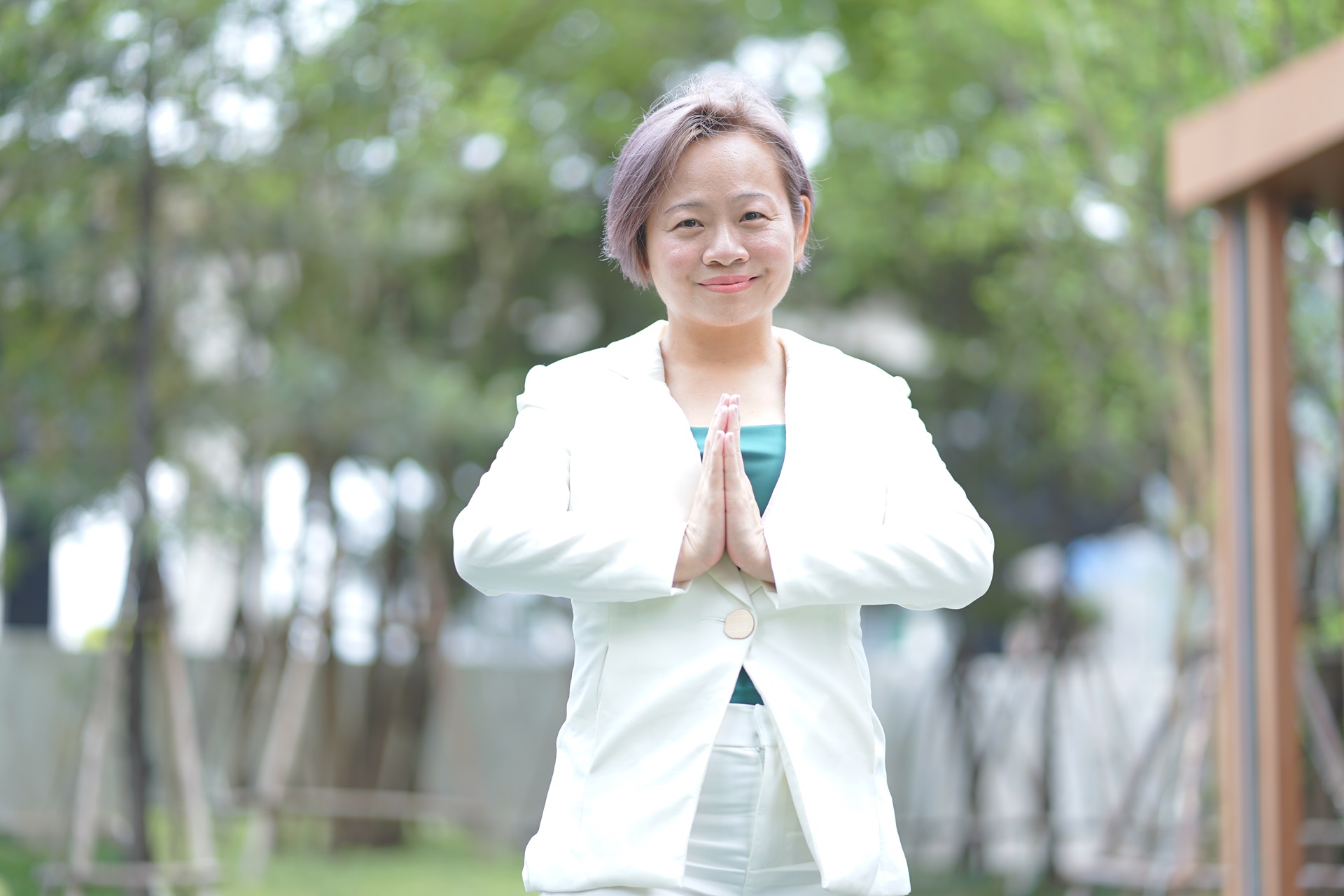
Amnesty International Thailand has currently introduced a new fundraising approach, utilizing direct fundraising agents called Face2Face (F2F). Jacqueline Yew, Deputy Director of Fundraising at Amnesty International Thailand, explained that after a successful pilot project, the organization has decided to formally reinstate F2F fundraising. Various studies have proven F2F highly effective in promoting Amnesty's human rights initiatives, with a high likelihood of reaching the public. Fundraising staff only engage in brief, three-minute conversations.
"Our main objective through F2F is to offer an overview of Amnesty International Thailand's identity, our mission, and the nature of our engagement in Thailand," she states.
Regarding the issue of financial contributions and addressing underlying structural challenges, Amnesty International Thailand's Deputy Director of Fundraising believes that regular face2face interactions with donors, whether monthly, quarterly, semi-annually, or on an ongoing basis, will foster financial sustainability. This approach enables Amnesty to stand alongside those whose rights have been violated for the long haul and to address systemic issues. She affirmed that Face2Face fundraising will enhance awareness of Amnesty and urged openness to dialogue, inviting people to hear our message.
"Operating under principles of accountability and donor privacy, we facilitate registrations via tablet devices. Our fundraising team collects basic donor information, but financial details must be inputted directly by donors themselves. Our staff can never see donors' financial data. We utilize secure software and payment gateways widely adopted by reputable organizations. The final step involves the donor's digital signature. Once submitted, the information cannot be retrieved, ensuring the donor's data remains secure and exclusive to Amnesty - not to fundraising staff or any third-party company." Jacqueline elaborates on the Face2Face fundraising process.
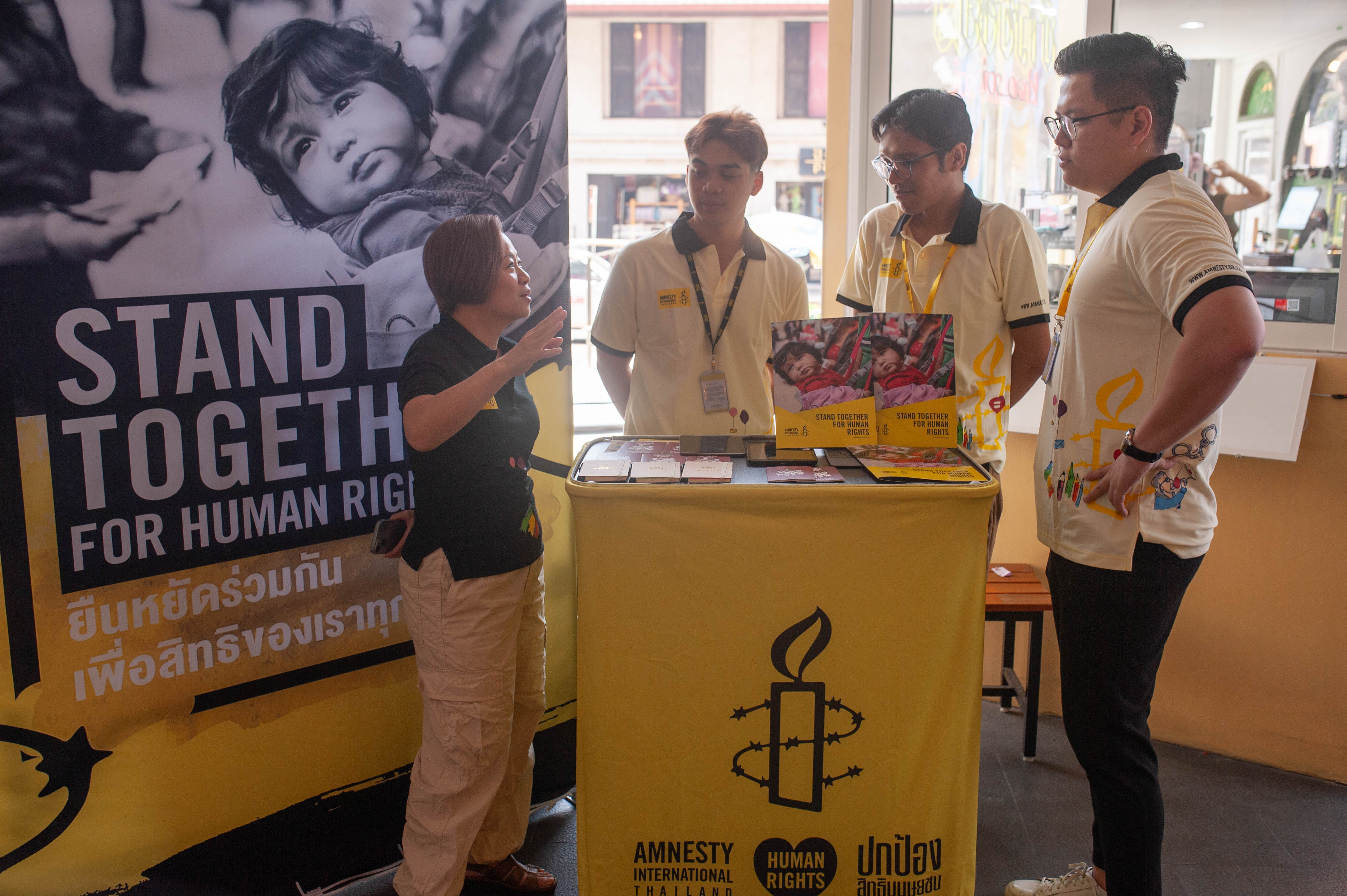
The Deputy Director of Fundraising anticipates that utilizing Face2Face fundraising as a channel will enable Amnesty to engage with a wide audience in public spaces like shopping malls, sky trains, subway stations, and various events, effectively conveying the message that human rights concern everyone. The success of this approach, she notes, hinges on the scale of the fundraiser. For instance, starting with a team of 10 staff could yield interactions with up to 100 people per day. The objective is to foster discussions, disseminate information, and heighten awareness. However, Jacqueline acknowledges that only a small fraction of these interactions may lead to deeper engagement, typically involving 6 to 7 people pausing to converse with the team for 3 to 5 minutes. She envisions these interactions as catalysts for shifting perceptions about Amnesty's work, as they prompt questions such as, 'Are you interested in learning about your rights?' or 'Do you know the fundamental human rights everyone possesses?'
"We won't immediately ask for donations," Jacqueline emphasizes. "Our priority is to educate individuals about human rights. If we detect heightened interest, we may then introduce the topic of continued support. We express gratitude for their attention and engagement with our discussions on Amnesty Thailand's endeavors. We inquire whether they now believe in our advocacy efforts and if they are inclined to sustain their support, fostering positive impacts on Thai society and contributing to global human rights initiatives. Our ultimate aim is to demonstrate that everyone can play a role in advancing human rights on a global scale."
Jacqueline Yew underscores that Face2Face communication serves as a crucial tool for Amnesty's outreach efforts. The organization's goal is to reach as many people as possible, ensuring widespread awareness of its mission and inviting additional support. However, she stresses the importance of first empowering ordinary people to advocate for human rights.
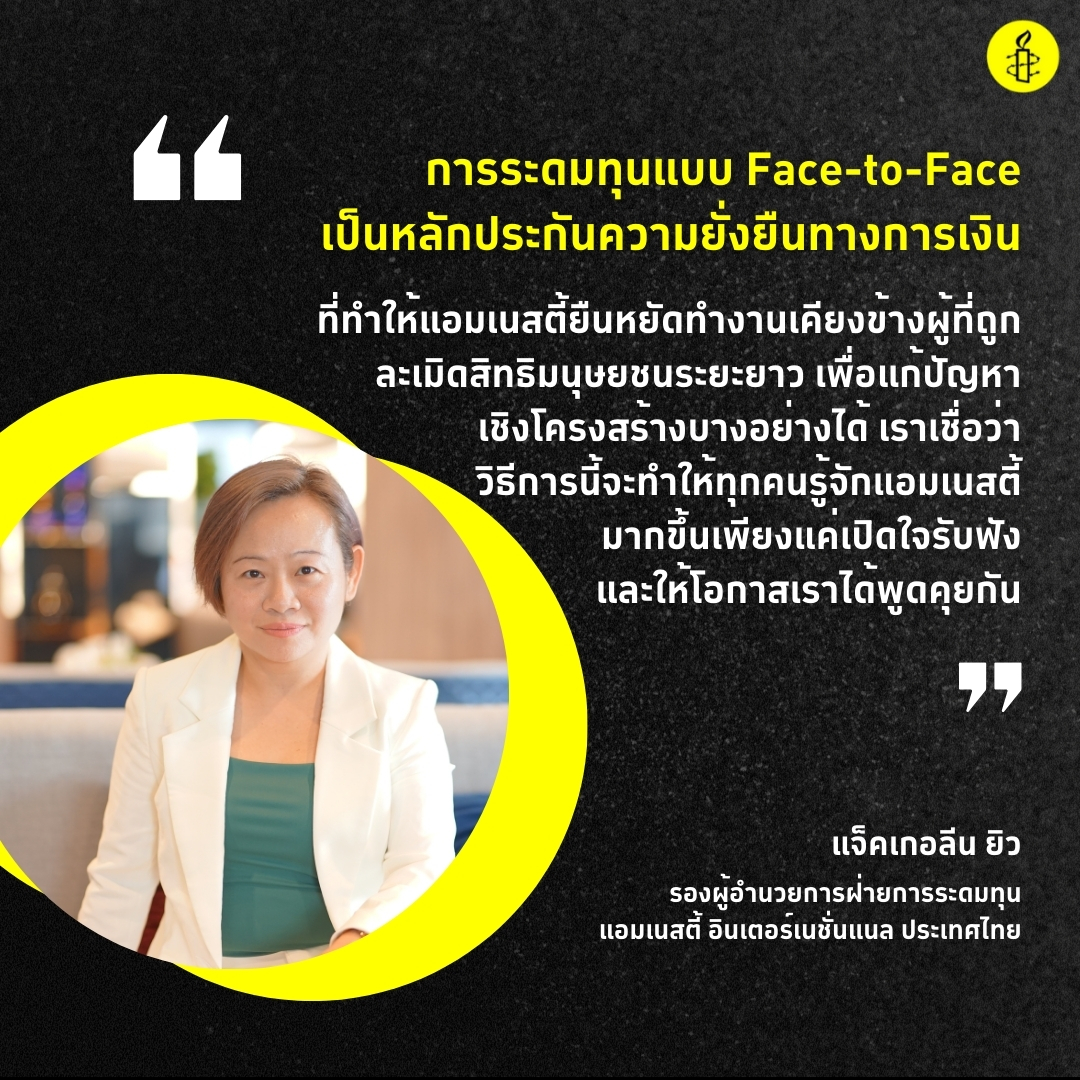
How Can Regular People Support Human Rights?
Human rights might seem like something distant, but Piyanut, Director of Amnesty Thailand, argues they are all around us. From birth to death, everything we do involves human rights. We have the right to clean air, yet we face pollution like PM 2.5. We have bodily autonomy - the right to decide our gender identity, parenthood, and choices to have a child. We want our children to have access to quality education, clean water, and a safe environment. These are all parts of human rights.
“Once you look around and question if situations seem unfair or unjust. This awareness paves the very first step to understanding your rights more deeply. After all, everyone deserves a good life and a promising future. That's the core of human rights, and Amnesty's role is to facilitate this process by collaborating with various stakeholders to fulfill their obligations in upholding these rights.” Piyanut says.
Regarding the embedding of human rights within society, Piyanut highlights the importance of starting to learn about human rights at home, where families should teach respect, understanding, and peace. Then it should spread to schools and communities. As more people understand human rights, they will start to demand that the government does its part in protecting them. This tiny effort is considered a big support for Amnesty.
Making a Difference Is Not as Challenging as It Seems
In the face of daily human rights violations, how can ordinary people effect change? Piyanut suggests that activism does not always require taking to the streets. There are numerous ways through which change can be driven. Participating in Face2Face (F2F) fundraising, for instance, enables collective action in advancing human rights both locally and globally with Amnesty.
"No matter who you are, there are various ways to show support. You can stay at home, reading the news and sharing relevant information to raise awareness. Alternatively, you can contribute intellectually by writing, sharing, volunteering, joining, or donating. There are many ways to get involved."
"In Thailand, we're witnessing a growing number of individuals recognizing their capacity to drive change. Youth are forming clubs and organizing events to promote human rights awareness. Communities are reaching out for human rights classrooms. These initiatives signify a positive shift in Thai society, offering hope for better change." Piyanut concludes.

The Human Rights Journey of Amnesty
Amnesty International represents a global movement comprising over 13 million individuals dedicated to catalyzing change in human rights, striving for a society that is equal and just for all. Notably, Amnesty was awarded the Nobel Peace Prize in 1977 for its impactful campaign against governmental torture. With over 63 years of tireless advocacy since its establishment in 1961, Amnesty International continues to fight for human rights, aiming to inspire those committed to fostering a fair and equal society, guided by the principles outlined in the Universal Declaration of Human Rights (UDHR).
Amnesty International Thailand emerged after the events of October 6th, 1976, as a strong voice for human rights. We operate under the core belief that "together ordinary people can change the world.” Through various activities - public campaigns, human rights education, and issue-based advocacy. Standing beside victims of human rights violations, Amnesty collaborates with the government to implement laws and policies that safeguard people's rights and freedoms.


